- Home
- Mobiles
- Mobiles Reviews
- Micromax A75 Superfone Lite review
Micromax A75 Superfone Lite review
By KS Sandhya Iyer | Updated: 16 September 2013 12:17 IST
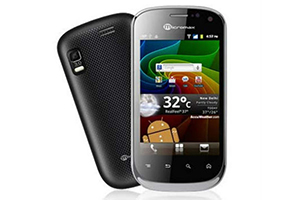
Advertisement
'Big things at affordable prices' seems to be the Micromax motto when it comes to budget phones. The company has set a trend in the below Rs.10,000 category with phones running the Android OS like the A55, A60 and A70. Tagged as the Superfone Lite, the A75 is a cheaper version of the A85. Sporting quite an appeal on the outside, we put the device to test and find out if it has what it takes to steal the thunder in its category.
Design & Build
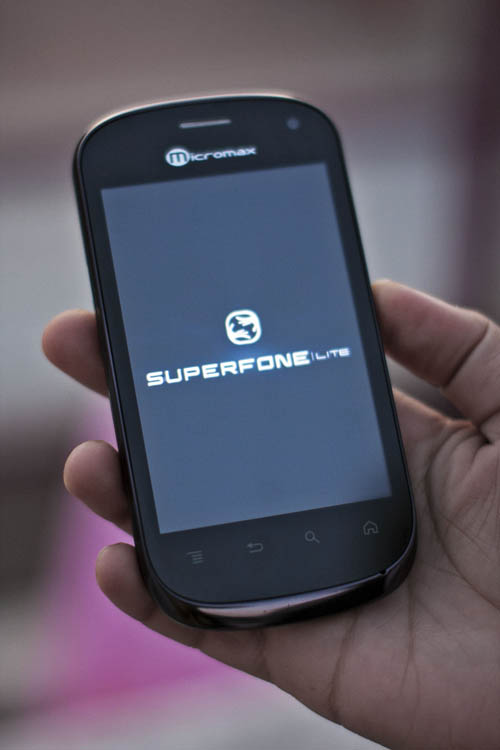
Unboxing the device felt like awakening a black knight from a white coffin! We couldn't help but reminisce the Google Nexus S when we first saw the device. The unit we received was charcoal black, weighing in at 135 grams. Though it is a bit heavy, the phone offers a firm grip and feels very comfortable to hold. The device came neatly packed in a white cardboard box along with a USB Charger, a pair of earphones, a user guide and a 1 year warranty card.
The build is plastic-y with a glossy finish at the back supported by metal on the sides. The display screen and the device overall, act as a fingerprint magnet owing to its glossy finish.
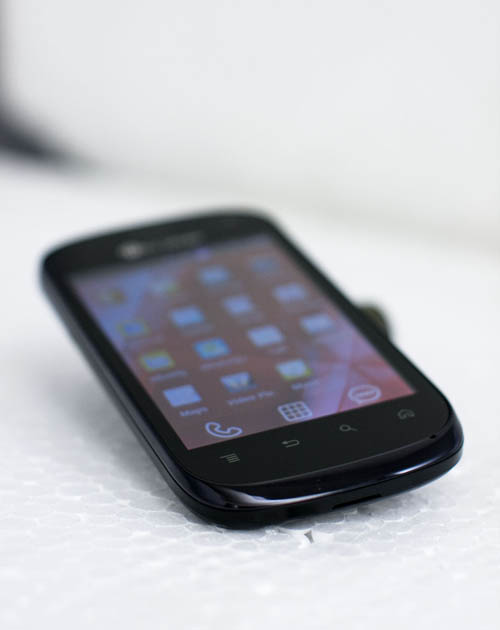
Staying true to the android tradition, the phone has four main capacitive touch buttons at the bottom: Menu, Back, Search and Home. The volume rocker is on the right (which seemed very inconvenient while pressing) while the USB port is on the left. The top panel has the power/sleep button along with a universal 3.5mm headphones jack.
The phone supports Dual GSM SIM functionality with the slots being located under the rear panel. They can be accessed only by removing the battery from its place. There is a microSD card slot located just adjacent to the 3MP camera. The device seems well-constructed and does have a distinctly unique charm to it that adds to its overall appeal.
Display
The phone features a 3.75" TFT capacitive display with a resolution of 320x480 pixels which is decent enough, though nothing to be too proud of. The screen is a bit reflective of background objects which is quite distracting.
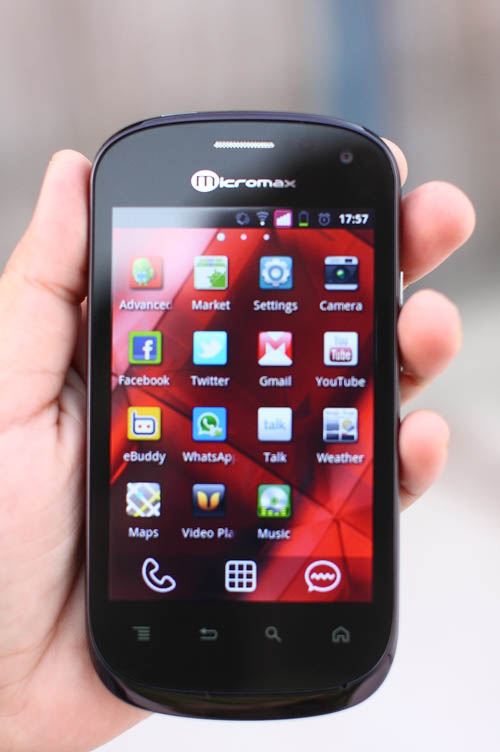
The colours appeared bright enough but reading in broad daylight can be quite a task despite increasing brightness levels to the maximum. The screen size is big enough for viewing videos and gaming at ease.
Camera Quality
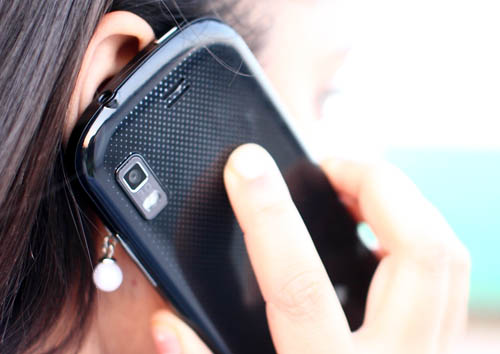
The device houses a 3MP rear camera with LED flash and a 0.3 MP front facing camera for video calling. There isn't much to expect from the camera since the resolution is quite low. Having said that, the image quality is very dull and it just about gets the job done. If you don't really get into the specifics or if the camera isn't something that interests you in a phone, it's a decent feature to have.
The camera menu is fairly simple with features such as Flash, Zoom (up to 4x), White Balance, Picture Size and Quality, Scene Mode, Capture Mode, ISO settings et al. Each category has various settings to choose from as per one's requirement.

We tried a couple of settings but they did little to improve the image quality. Despite the sharpness being set at high, the pictures still looked blurry. Also, the shutter lag while taking a picture with flash is ridiculously long at about 5 seconds!
Videos didn't fair too well either. They also appeared quite dull and grainy. Well, expecting a 3MP to shoot good quality videos is stretching it a bit too far. YouTube videos however appeared sharp when viewed in the HQ setting.
OS & Interface
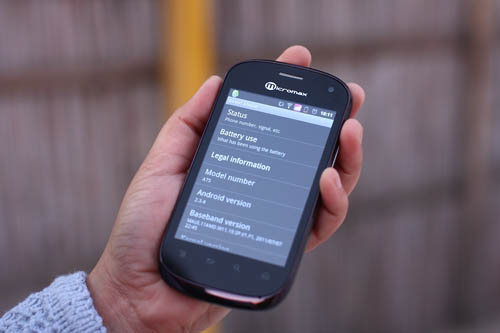
The device runs on Androidv2.3.4 and what is disturbing is the sluggish UI over Gingerbread. The 650 MHz processor just isn't beefy enough when it comes to performance. The device has an internal memory of 190MB which is expandable up to 32GB.
There are up to 9 customizable home screens which you can add one-by-one as and when you need them.The device comes with a pre-installed Theme Manager that allows you to choose from a set of 5 colourful themes that look beautiful and vibrant. The icon representation changes with each theme.
You can view the Notifications and Toolkits option by swiping the screen from top to bottom. Toolkits basically gives access to a quick menu with 12 options including power off, reboot, auto brightness settings, Wi-Fi, lock screen settings etc. The Phone, Menu and Messaging icons are located at the bottom of the screen for quick access. The Menu has all the apps listed in alphabetical order. You can choose to add these apps for quick access on your home screen.
Pre-loaded software
The phone comes with a whole bunch of pre-installed apps like TOI, Polaris Office (for accessing MS Documents), Quikr, eBuddy, WhatsApp along with Facebook, Twitter and of course the Google bundle which includes Gmail, YouTube, Gtalk and Maps. There's also a stock market app called InStocks updating you with the latest BSE/NSE figures. UMPlayer is an in-built video player app with a simple interface while you also have a Music Player for songs on your phone.
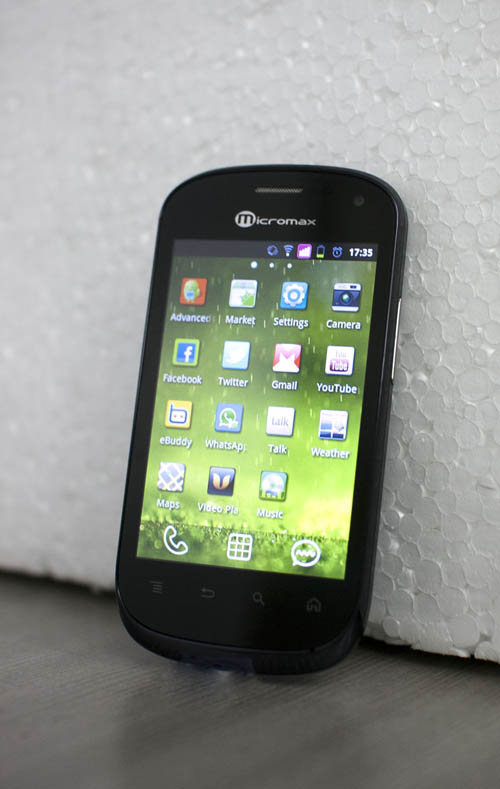
Saavn is an app that helps you find your favourite songs in Hindi, Punjabi and even Tamil. It also gives you a weekly top songs playlist. You can save them in your very own playlist which can be created by logging in with your Facebook account or with a separate Saavn account itself. Then there's Teen Patti, which is a fun gaming app. Besides these, you have extras like a sound recorder, a post card app and a File Manager as well (Phew!).
Apart from the Android Market, the company has added Mi-Apps which lists a selection of various other apps under three main tabs namely: Applications, Games and Themes, giving the user plenty of options to choose from.
Performance
With smart phones getting smarter each day, functionality and performance now take precedence over beauty. Starting with battery life, the phone performed decently, running an entire day on a full charge though the 1300mAH Li-ion battery does drain out on prolonged usage with multiple tasks at hand.
The foremost purpose of any phone still remains to make and receive calls and this is where the A75 fails miserably. Call drops were unusually high even in high network areas. The worst experience was that the phone hung while multi-tasking and removing the battery was the only way to regain functionality. Texting is more comfortable in landscape mode since the keyboard seems more spaced out as opposed to the portrait mode.
The gaming experience was also ruined to quite an extent. Angry Birds, which has now become a benchmark in gaming for every Android phone, was very slow in loading and hung a couple of times before it finally crashed. Opening and closing applications also consumed a considerable amount of time.

The audio quality is again decent enough on the loudspeaker. While listening to songs on the headphones (that came with the phone), the levels tend to peak quite a bit. The built-in FM Radio was really disappointing as the device had frequency issues and was unable to catch popular stations like Fever 104.0 FM (Our Nokia X2-01 did better than this!).
The Dual SIM feature is one thing we could vouch for. The setting allows you to select the purpose for each SIM and also set preference of usage (whether to operate one SIM at a time or both simultaneously). The SIMs are colour coded and easily distinguishable from each other. Once you insert the second SIM, the screen prompts you for setting your default SIM to make voice calls, video calls, messaging and data connection. You can always deactivate the SIM you don't want to use. When making Voice calls or Messaging, the device gives an option called Always Ask so that you can choose which SIM to use for outgoing calls or messages.
Overall, the performance isn't as satisfying as you'd expect mainly due to the slow processing speeds.
Verdict
The device doesn't quite really justify being nicknamed as the Superfone Lite. Though there are a couple of good features, including the bundle of handy apps and the dual SIM service feature, the phone completely loses out on slow processing speeds. Though it is competitively priced among its peers like the Samsung Galaxy Y and the Motorola Fire XT311 and appears to be a strong contender, it still fails to perform as a 'Superfone'. You ought to miss this one while considering your options for a budget Android phone.
Pros
Great Price
Attractive Design
Good Display Size
Dual SIM
Cons
Sluggish UI
Poor Camera
Slow Processor
Price: Rs. 8,900
Ratings
Performance: 3
Features: 4
Ease of setup: 4
Ergonomics: 3.5
Wow factor: 3.5
Overall: 3.5
Design & Build
Unboxing the device felt like awakening a black knight from a white coffin! We couldn't help but reminisce the Google Nexus S when we first saw the device. The unit we received was charcoal black, weighing in at 135 grams. Though it is a bit heavy, the phone offers a firm grip and feels very comfortable to hold. The device came neatly packed in a white cardboard box along with a USB Charger, a pair of earphones, a user guide and a 1 year warranty card.
The build is plastic-y with a glossy finish at the back supported by metal on the sides. The display screen and the device overall, act as a fingerprint magnet owing to its glossy finish.
Staying true to the android tradition, the phone has four main capacitive touch buttons at the bottom: Menu, Back, Search and Home. The volume rocker is on the right (which seemed very inconvenient while pressing) while the USB port is on the left. The top panel has the power/sleep button along with a universal 3.5mm headphones jack.
The phone supports Dual GSM SIM functionality with the slots being located under the rear panel. They can be accessed only by removing the battery from its place. There is a microSD card slot located just adjacent to the 3MP camera. The device seems well-constructed and does have a distinctly unique charm to it that adds to its overall appeal.
Display
The phone features a 3.75" TFT capacitive display with a resolution of 320x480 pixels which is decent enough, though nothing to be too proud of. The screen is a bit reflective of background objects which is quite distracting.
The colours appeared bright enough but reading in broad daylight can be quite a task despite increasing brightness levels to the maximum. The screen size is big enough for viewing videos and gaming at ease.
Camera Quality
The device houses a 3MP rear camera with LED flash and a 0.3 MP front facing camera for video calling. There isn't much to expect from the camera since the resolution is quite low. Having said that, the image quality is very dull and it just about gets the job done. If you don't really get into the specifics or if the camera isn't something that interests you in a phone, it's a decent feature to have.
The camera menu is fairly simple with features such as Flash, Zoom (up to 4x), White Balance, Picture Size and Quality, Scene Mode, Capture Mode, ISO settings et al. Each category has various settings to choose from as per one's requirement.
We tried a couple of settings but they did little to improve the image quality. Despite the sharpness being set at high, the pictures still looked blurry. Also, the shutter lag while taking a picture with flash is ridiculously long at about 5 seconds!
Videos didn't fair too well either. They also appeared quite dull and grainy. Well, expecting a 3MP to shoot good quality videos is stretching it a bit too far. YouTube videos however appeared sharp when viewed in the HQ setting.
OS & Interface
The device runs on Androidv2.3.4 and what is disturbing is the sluggish UI over Gingerbread. The 650 MHz processor just isn't beefy enough when it comes to performance. The device has an internal memory of 190MB which is expandable up to 32GB.
There are up to 9 customizable home screens which you can add one-by-one as and when you need them.The device comes with a pre-installed Theme Manager that allows you to choose from a set of 5 colourful themes that look beautiful and vibrant. The icon representation changes with each theme.
You can view the Notifications and Toolkits option by swiping the screen from top to bottom. Toolkits basically gives access to a quick menu with 12 options including power off, reboot, auto brightness settings, Wi-Fi, lock screen settings etc. The Phone, Menu and Messaging icons are located at the bottom of the screen for quick access. The Menu has all the apps listed in alphabetical order. You can choose to add these apps for quick access on your home screen.
Pre-loaded software
The phone comes with a whole bunch of pre-installed apps like TOI, Polaris Office (for accessing MS Documents), Quikr, eBuddy, WhatsApp along with Facebook, Twitter and of course the Google bundle which includes Gmail, YouTube, Gtalk and Maps. There's also a stock market app called InStocks updating you with the latest BSE/NSE figures. UMPlayer is an in-built video player app with a simple interface while you also have a Music Player for songs on your phone.
Saavn is an app that helps you find your favourite songs in Hindi, Punjabi and even Tamil. It also gives you a weekly top songs playlist. You can save them in your very own playlist which can be created by logging in with your Facebook account or with a separate Saavn account itself. Then there's Teen Patti, which is a fun gaming app. Besides these, you have extras like a sound recorder, a post card app and a File Manager as well (Phew!).
Apart from the Android Market, the company has added Mi-Apps which lists a selection of various other apps under three main tabs namely: Applications, Games and Themes, giving the user plenty of options to choose from.
Performance
With smart phones getting smarter each day, functionality and performance now take precedence over beauty. Starting with battery life, the phone performed decently, running an entire day on a full charge though the 1300mAH Li-ion battery does drain out on prolonged usage with multiple tasks at hand.
The foremost purpose of any phone still remains to make and receive calls and this is where the A75 fails miserably. Call drops were unusually high even in high network areas. The worst experience was that the phone hung while multi-tasking and removing the battery was the only way to regain functionality. Texting is more comfortable in landscape mode since the keyboard seems more spaced out as opposed to the portrait mode.
The gaming experience was also ruined to quite an extent. Angry Birds, which has now become a benchmark in gaming for every Android phone, was very slow in loading and hung a couple of times before it finally crashed. Opening and closing applications also consumed a considerable amount of time.
The audio quality is again decent enough on the loudspeaker. While listening to songs on the headphones (that came with the phone), the levels tend to peak quite a bit. The built-in FM Radio was really disappointing as the device had frequency issues and was unable to catch popular stations like Fever 104.0 FM (Our Nokia X2-01 did better than this!).
The Dual SIM feature is one thing we could vouch for. The setting allows you to select the purpose for each SIM and also set preference of usage (whether to operate one SIM at a time or both simultaneously). The SIMs are colour coded and easily distinguishable from each other. Once you insert the second SIM, the screen prompts you for setting your default SIM to make voice calls, video calls, messaging and data connection. You can always deactivate the SIM you don't want to use. When making Voice calls or Messaging, the device gives an option called Always Ask so that you can choose which SIM to use for outgoing calls or messages.
Overall, the performance isn't as satisfying as you'd expect mainly due to the slow processing speeds.
Verdict
The device doesn't quite really justify being nicknamed as the Superfone Lite. Though there are a couple of good features, including the bundle of handy apps and the dual SIM service feature, the phone completely loses out on slow processing speeds. Though it is competitively priced among its peers like the Samsung Galaxy Y and the Motorola Fire XT311 and appears to be a strong contender, it still fails to perform as a 'Superfone'. You ought to miss this one while considering your options for a budget Android phone.
Pros
Great Price
Attractive Design
Good Display Size
Dual SIM
Cons
Sluggish UI
Poor Camera
Slow Processor
Price: Rs. 8,900
Ratings
Performance: 3
Features: 4
Ease of setup: 4
Ergonomics: 3.5
Wow factor: 3.5
Overall: 3.5
Comments
For the latest tech news and reviews, follow Gadgets 360 on X, Facebook, WhatsApp, Threads and Google News. For the latest videos on gadgets and tech, subscribe to our YouTube channel. If you want to know everything about top influencers, follow our in-house Who'sThat360 on Instagram and YouTube.
Related Stories
Popular on Gadgets
- Samsung Galaxy Unpacked 2025
- ChatGPT
- Redmi Note 14 Pro+
- iPhone 16
- Apple Vision Pro
- Oneplus 12
- OnePlus Nord CE 3 Lite 5G
- iPhone 13
- Xiaomi 14 Pro
- Oppo Find N3
- Tecno Spark Go (2023)
- Realme V30
- Best Phones Under 25000
- Samsung Galaxy S24 Series
- Cryptocurrency
- iQoo 12
- Samsung Galaxy S24 Ultra
- Giottus
- Samsung Galaxy Z Flip 5
- Apple 'Scary Fast'
- Housefull 5
- GoPro Hero 12 Black Review
- Invincible Season 2
- JioGlass
- HD Ready TV
- Laptop Under 50000
- Smartwatch Under 10000
- Latest Mobile Phones
- Compare Phones
Latest Gadgets
- Vivo Y300 (China)
- HMD Arc
- Lava Blaze Duo 5G
- Realme Neo 7
- Honor 300 Ultra
- Honor 300
- Honor 300 Pro
- Realme Note 60x
- Asus Zenbook S 14
- MacBook Pro 16-inch (M4 Max, 2024)
- Tecno Megapad 11
- Lenovo Yoga Pad Pro AI (2024)
- Redmi Watch 5
- Huawei Watch Ultimate Design
- Sony 65 Inches Ultra HD (4K) LED Smart TV (KD-65X74L)
- TCL 55 Inches Ultra HD (4K) LED Smart TV (55C61B)
- Sony PlayStation 5 Pro
- Sony PlayStation 5 Slim Digital Edition
- Blue Star 1.5 Ton 3 Star Inverter Split AC (IC318DNUHC)
- Blue Star 1.5 Ton 3 Star Inverter Split AC (IA318VKU)
© Copyright Red Pixels Ventures Limited 2024. All rights reserved.


















